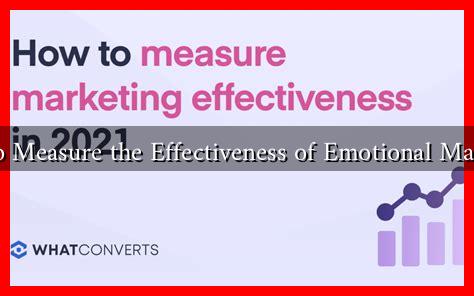-
Table of Contents
How to Measure the Effectiveness of Emotional Marketing
Emotional marketing is a powerful strategy that taps into the feelings and emotions of consumers to drive engagement and sales. By creating a connection that resonates on a personal level, brands can foster loyalty and encourage purchasing behavior. However, measuring the effectiveness of emotional marketing can be challenging. This article explores various methods and metrics to evaluate the impact of emotional marketing campaigns.
Understanding Emotional Marketing
Before diving into measurement techniques, it’s essential to understand what emotional marketing entails. This approach leverages emotions such as happiness, sadness, fear, and nostalgia to create a compelling narrative around a product or service. Brands like Coca-Cola and Nike have successfully employed emotional marketing to build strong connections with their audiences.
Key Metrics for Measuring Effectiveness
To assess the effectiveness of emotional marketing, brands can utilize several key metrics:
- Engagement Rates: Track likes, shares, comments, and overall interaction with your content. High engagement often indicates that the emotional message resonated with the audience.
- Brand Sentiment Analysis: Use tools to analyze social media mentions and customer feedback. Positive sentiment can indicate successful emotional engagement.
- Conversion Rates: Measure how many viewers of your emotional marketing campaign went on to make a purchase. A higher conversion rate suggests that the emotional appeal was effective.
- Customer Retention Rates: Emotional marketing can foster loyalty. Track how many customers return for repeat purchases after engaging with your campaign.
- Net Promoter Score (NPS): This metric gauges customer loyalty and satisfaction. A higher NPS can indicate that your emotional marketing efforts have created a positive brand perception.
Qualitative Methods for Assessment
While quantitative metrics provide valuable data, qualitative methods can offer deeper insights into consumer emotions and perceptions. Consider the following approaches:
- Focus Groups: Conduct focus group discussions to gather feedback on emotional marketing campaigns. Participants can share their feelings and thoughts, providing qualitative data that numbers alone cannot capture.
- Surveys and Questionnaires: Create surveys that ask specific questions about how consumers felt after engaging with your campaign. This can help identify which emotions were most effectively evoked.
- Customer Interviews: One-on-one interviews can provide in-depth insights into how emotional marketing influenced individual purchasing decisions.
Case Studies: Successful Emotional Marketing Campaigns
Examining successful case studies can provide valuable lessons on measuring emotional marketing effectiveness:
- Always #LikeAGirl Campaign: This campaign by Always aimed to empower young girls. The emotional appeal led to a significant increase in brand engagement, with a 76% increase in brand favorability among the target audience.
- Google’s “Year in Search”: Each year, Google releases a video summarizing the most searched topics, often evoking strong emotions. The 2020 video, which highlighted resilience during the pandemic, garnered millions of views and positive sentiment, showcasing the power of emotional storytelling.
Utilizing Technology for Measurement
In today’s digital age, technology plays a crucial role in measuring emotional marketing effectiveness. Here are some tools and technologies that can help:
- Social Listening Tools: Platforms like Hootsuite and Brandwatch can help track brand sentiment and engagement across social media channels.
- Analytics Software: Google Analytics and similar tools can provide insights into website traffic and conversion rates linked to emotional marketing campaigns.
- Emotion Recognition Software: Advanced technologies can analyze facial expressions and voice tones to gauge emotional responses to marketing content.
Conclusion
Measuring the effectiveness of emotional marketing is essential for brands looking to create lasting connections with their audience. By utilizing a combination of quantitative metrics, qualitative methods, and advanced technology, marketers can gain a comprehensive understanding of their campaigns’ impact. Successful emotional marketing not only drives sales but also fosters brand loyalty and positive sentiment. As brands continue to navigate the complexities of consumer emotions, the ability to measure and adapt emotional marketing strategies will be crucial for long-term success.
For further reading on emotional marketing strategies, consider exploring resources from HubSpot.


